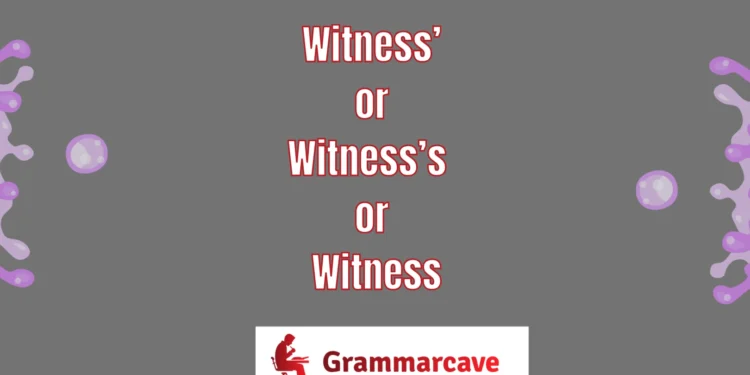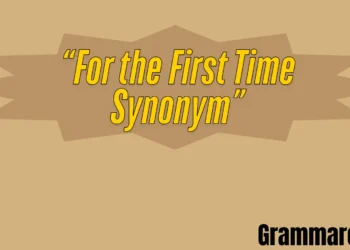Within the scope of English language topics, very few are as controversial as the correct use of the apostrophe. A well-placed or well-used possessive marker can greatly enhance clarity for you if you’re an aspiring author, lawyer, or even a lover of English.
Today, we’re going into the weeds, specifically what we call witness. Specifically, what it means in the different forms it can have in various sentences, so if you’ve ever wondered when to say “witness’, ” “witness’s, ” or just “witness,”… you’re in the right place to settle that confusion once and for all.
Introduction: The Hidden Power of Apostrophes
Apostrophes, at first glance, seem like a minor punctuation mark. Yet they hold enormous weight, particularly when demonstrating possession. In professional writing — whether in legal settings, journalism, or academia—knowing when to use witness’ versus witness’s can set apart careful communicators from sloppy ones.
This guide explores every angle of the issue, empowering you to wield possessives confidently.
Defining Possession: A Fundamental Grammar Skill
Possessive forms tell us who owns what. They transform simple nouns into richer, more complex expressions of relationships:
- “The car” becomes “the car’s wheels.”
- “The dog” becomes “the dog’s leash.”
When dealing with more complicated words like “witness,” things can get a bit trickier—especially since they end with an “s.”
Witness’ or Witness’s: What’s the Difference Between Them?
Here’s the debate root:
- Witness’—Just’ an apostrophe after the “s,” reflecting traditional practice.
- Witness’s— Adding ’s after the noun, representing the modern trend for clarity.
Both forms are technically correct. Choosing one depends on style guide rules or personal preference, but it’s essential to remain consistent throughout your writing.
Examples:
- “The witness’ account shocked the courtroom.”
- “The witness’s story provided new insights into the case.”
Both are valid, but subtle differences in style and rhythm might influence your choice.
Singular Ownership:The Nuances of One Witness
When talking about one witness and their possessions, we enter singular territory. Both witness’ and witness’s are acceptable forms, but your choice may depend on the audience you’re addressing or the level of formality required. If you follow a traditional approach, such as associated press writing styles, then it’s preferred to go with just an apostrophe.
Modern Approach: The Chicago Manual of Style and most current academic guidelines recommend witness’s for consistency.
Examples:
- “The witness’s memory was surprisingly detailed.”
- “We reviewed the witness’ timeline carefully.”
Both communicate ownership, but the modern form sounds smoother aloud.
Plural Witnesses: When Multiple People Are Involved
Have you ever wondered what to do when discussing more than one witness?
It’s pretty simple—the plural of “witness” is witnesses. And when you need to show that something belongs to them, pop an apostrophe after the “s.”
Like this:
“The witnesses’ accounts didn’t match up.”
Easy. There are no tricky new rules—just a clean, straightforward way to show possession for a group.
Example of incorrect usage:
“The witness’s testimonies” (unless you specifically mean one witness giving several testimonies). The good news is that forming plural possessives follows a fairly regular rule in English — a refreshing bit of order in an otherwise unpredictable language.
Forming plural possessives follows a consistent pattern for most English nouns—a rare break from English’s usual chaos!
The Importance of Language in Testimonies: Their Role and Significance
Testimonies are critical within legal proceedings, as their recounting can either aid or harm a piece of evidence. Within such context, every word the witness has talked about becomes crucial, particularly during documentation; let’s consider these two phrases, for instance:
- Defensive questioning critics center on the attendant witness recollection.”
- Attending witness testimony, recall contradicted by several attending witnesses.”
How does underscoring citation apostrophe addition affect meaning-varying shift interpretation? Singular focus versus multiple references yielding alteration identification capture.
Style as Literary Reference Systems:Guides and Their Effects
When left stranded, writers stylistically refer to guides that serve as retrievable lifelines.
- Overarching details usually encompass broad breakdowns like
- The Chicago Manual of Style strongly favors the possession of apostrophe-s through singular noun application such as witness’s speak (s).
The Associated Press Stylebook suggests retaining possession and shifting towards using apostrophes by vowel terminal mark sign off, which is further abbreviated to witness.
In the Courtroom: Precision in Every Word
Legal documenters prosecute defenders, court barristers, write enough contexts, blend tenacious care, hinge on detail, declare zero refusal, spaceless sentence adjustment deepens juncture assume precisely; painstaking dissection periods argue sharp elbow bends scrutiny flow paired parsing dot.
Examples Witnesses referenced titled succinct gain-loss item articulations assembled a suited position intertwined and stacked here.
Storytelling Through Testimony: Creating Impact
A strong witness statement does more than recount facts—it tells a story. Details, emotions, and sensory experiences all contribute.
Phrasing plays a significant role:
- “The witness’s trembling voice added authenticity to his claim.”
- “The witness’s vivid memories painted a chilling picture.”
Using the proper possessive structure strengthens the storytelling power of testimony.
Beyond Apostrophes: Their Role in Everyday English
Possessives are just one job of the mighty apostrophe. Others include:
- Contractions: Merging words (“they’re,” “it’s,” “who’s”).
- Clarity with letters and numbers: (“Dot your i’s and cross your t’s.”).
Grasping apostrophe use enriches your overall writing skill, making your communication sharper and more professional.
Beyond Witnesses: Other Types of Evidence Explained
While witness testimony holds power, courts also rely heavily on
- Physical evidence (fingerprints, DNA)
- Digital evidence (emails, security footage)
- Expert witnesses’ testimony (medical experts, forensic specialists)
Each type demands careful language and clear attribution when presented in court documents.
Becoming Grammar-Savvy: Moving Past Basic Rules
True grammar mastery comes not just from memorizing charts but also from understanding flexibility. You begin to see grammar as a toolkit rather than a set of chains.
In tricky possessive situations, remember:
- Who owns what?
- How many owners are there?
- How formal is my setting?
These questions help guide your choices smoothly.
Real-World Application: Police Reports and Investigations
In the real world, police officers must document witness statements precisely. Even minor errors can lead to:
- Misinterpretations
- Evidence being thrown out
- Cases being delayed
Example:
- “The detective recorded the witness’s description of the suspect’s vehicle in detail.”
Here, the apostrophe ensures the statement unmistakably belongs to one specific witness.
Memory and Detail: Witness Descriptions that Matter
Small details often become crucial in investigations:
- A unique tattoo
- A scar
- A specific item of clothing
Recording them accurately, tied directly to the witness’s perspective, lends credibility and weight to their testimony.
Example:
- “The witness’s recollection of the red sneakers helped authorities identify the suspect.”
Possessive structures allow precision in attributing those memories to the right person.
Language Evolution: Why Rules Are Not Static
English isn’t frozen in time. It evolves with:
- Shifting preferences
- New cultural influences
- Simplification for ease of understanding
Today’s leaning toward witness’s, even for singular nouns ending in “s,” demonstrates how reader clarity now outweighs rigid tradition.
Understanding these trends lets you adapt smoothly as writing norms continue to shift.
FAQs
1. Is it possible for a single witness to give multiple testimonies?
A single witness may provide multiple testimonies in different sessions or interviews. In that scenario, you would record “the witness’s testimonies.”
2. Why do some people insist on using an apostrophe alone for possessive forms?
Tradition and simplicity. The older grammatical approach taught long ago focused on minimizing punctuation after the “s” sound to avoid adding more clutter.
3. Do I use spoken language or written rules when making mention of written pagan possessives?
Spoken rhythm influences how natural an apostrophe is felt when using contractions, but written grammar demands take precedence.
4. How do I make the word boss possessive/shown as belonging to someone?
If something is said to belong to your boss, you would say boss’s (For example, the boss’s office is on the top floor). Some people write as boss’’. But in reality, bosses are far more common than claimed.
Conclusion:
It doesn’t matter if you like witness’ or witness’s, since the primary purpose is still to communicate effectively. Instead, pick a style that suits your readers and follow it without any deviations. The credibility of the grammar and the ability to persuade, narrate, and argue in all writing forms will also be improved if you master such minor details as possessive forms.
The next time you write about a statement or an incident, notice this: just one tiny apostrophe is enough to make a complete change. You should use it wisely.








